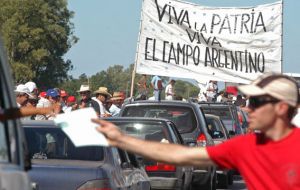MercoPress. South Atlantic News Agency
Argentine farmers lobbying governors to join struggle
 Farmers protest along all over Argentines roads continues
Farmers protest along all over Argentines roads continues Argentine striking farmers completed the second day of their renewed protest with an open meeting in one of the country's northern provinces warning that the country is beginning to feel recession symptoms because of the stoppage, while from Buenos Aires the Kirchners administration continued with their verbal attack calling them greedy and irresponsible.
In a display of unity representatives from the four organizations behind the protest addressed the meeting which later turned into a huge march of tractors, farm equipment and trucks along local cities where people applauded and displayed flags as a message of support. Apparently the farmers' strategy is to continue with these massive concentrations in Argentina's provinces where there's strong support for the strike and at the same time try to convince governors and mayors to openly join the protest against the Kirchners grains and oil seed export taxes which is beginning to pinch local economies. "Manufacturers of farm equipment are in the beginning of a recession; construction is retracting, thousands of jobs are in the line in the agro business industry", said Eduardo Buzzi president of the Argentine Agrarian Federation. "We helped the economy of the country to recover in a magnificent effort but since March 12 (when the export taxes were increased) the economy seems to begin to sputter", he added. Next week farmers will be meeting with Cordoba's governor, a powerful figure inside the ruling coalition but who has sided with the farmers' demand and is part of a group of elected authorities who favor a political negotiated solution to the conflict. In the rest of Argentina farmers held assemblies, organized pickets along highways stopping trucks loaded with grains and handed out pamphlets and literature to travelers explaining their plight and grievances. In Rosario, Argentina's main oil seeds and grains market was empty, which in practical terms means no exports (Argentina exports 95% of its soy bean crop) and no prices to regulate operations. In Buenos Aires livestock market Liniers, operations were limited because the entry of cattle was virtually cut to half. But in some limited locations the pickets are becoming stricter stopping all trucks every two hours, impeding international trade by land particularly with Brazil. Meantime there are insistent rumors that the Gendarmerie is preparing to move in and disperse pickets. From Buenos Aires cabinet chief Alberto Fernandez called the farmers "irresponsible" for having thrown over board an "excellent opportunity for dialogue". He added that following the latest meeting farmers' representatives "had gone nuts" because they said "we had admitted that the export taxes system was flawed". "I'm fully convinced that this time is not our fault because we offered to talk about what they wanted but it all failed because they didn't want to", said Fernandez. "It's going to be very difficult to fix this". Hugo Biolcati vicepresident of the Argentine Rural Society was chosen to reply to President Cristina Fernandez de Kirchner statements that "I have the guts to hold out" (the strike). "Sure the government can hold out, they have all the financial resources, our financial resources, almost unlimited financial capacity, but we have dignity", said Biolcati. "We're just hard working farmers facing politicians able at their trade; we're but children next to them when it comes to politics". Mrs. Kirchner speaking is one of Argentina's poorest provinces said that she was shocked at the display of "lack of solidarity and greed from the rich farmers who never understood the country". She added it was "necessary to federalize wealth" and those who have most, "must contribute most". Luis Juez an important political leader from Cordoba made some acid comments on the situation when asked about the Kirchners attitude towards the conflict: "they are penguins, never seen penguins walk backwards". The current conflict begun in early March when the new taxing system was announced triggering a three weeks farmers' lock out which left Argentine cities short of food. This was followed by a month's truce when both sides agreed to a round of talks to discuss camp issues. However hardliners in the Kirchner administration repeatedly prevented any agreement from become effective. Five days later after the truce was over the frustrated farmers where back protesting although this time promising not to cause food shortages. Farmers insist the new eight days protest is for the resumption of serious discussions which help reach negotiated solutions.




Top Comments
Disclaimer & comment rulesCommenting for this story is now closed.
If you have a Facebook account, become a fan and comment on our Facebook Page!